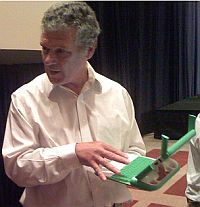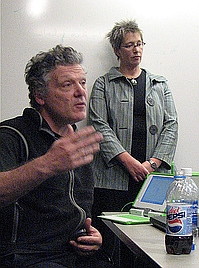In his first detailed interview since leaving One Laptop Per Child, Walter Bender expanded on why he left OLPC and what his plans are for Sugar in a conversation with Wade Roush of Xconomy.
To Walter, Microsoft Windows is not really the issue; it's the opportunity to educate the world on what education can be. Just listen to what he feels is Nicholas Negroponte's change in direction:
Bender:: Then it's a matter of what's next. And what's next for me is to continue to work on the software tools for learning - to broaden their scope and applicability. What's next for OLPC? I would rather OLPC answer for themselves.For me, personally, that's exactly why I've followed OLPC so closely for the last two years - it represented a disruptive shift in the whole technology industry and its relationship to the developing world.Nicholas has made it clear, at least to me, that OLPC needs to be strategically agnostic about learning - that it can't be prescriptive about learning. So that's his opinion and that's where he's taking OLPC, and that's not what I want to do, so I left.
Xconomy: When you say "agnostic about learning," what I take that to mean is that there's a feeling that the XO Laptop should run Windows, and not just Linux and Sugar.
Bender: I think it's pretty obvious and was obvious from the very beginning that it's a lot easier to cater to people's comfort than to be disruptive. Nicholas had that wonderful quote in BusinessWeek about a month ago - that OLPC is going to stop acting like a terrorist and start emulating Microsoft.
If you read between the lines, the idea is to stop trying to be disruptive and to start trying to make things comfortable for decision-makers. And that's a marketing strategy, and one that I think has been adopted by many laptop manufacturers.
Personally, I think that the customer is not always right, and that a role that a non-profit can play is to try to demonstrate better ways of doing things and let the market follow them. But that is a minority opinion, so I left to do my own thing.
A Game-Changing Opportunity
OLPC presented us with a whole new way to think about education in the developing world: Constructionism personified as an Open Source educational software stack running on a rugged, efficient and affordable laptop. While we all may not agree on exactly how to achieve that goal, the very idea was revolutionary.
Many of us invested our hearts and minds into OLPC because it was an Open Source software project. Here was the chance to wean entire countries off the thought that proprietary business software is appropriate for every situation.
Others got excited that the hardware was designed specifically for poor communities where electricity and air conditioning are rare. No more expensive generators spewing exhaust to support overbuilt and then fan-cooled processors.
Put those two ideas together in a nonprofit education project and you have a global movement that actually delivered a Sugar/Linux software stack on the XO laptop - a targeted learning combination that is specifically designed to do one thing and one thing well: educate children in resource poor environments.
Being agnostic isn't disruptive
Walter is right about Windows XP on the XO laptop. It isn't disruptive. It makes the XO a rugged general purpose computer, one use case of which could be education. Sugar on other platforms is a great addition to those distributions. But alone, it isn't disruptive either.
The real prescription for change, the idea that had us all foaming with tech-lust, was the combination of education-specific Open Source software running on clock-stopping hot technology to empower education in the developing world. To change any part of that equation this late in the game represents a fundamental shift in the project and is alienating all of us who wanted to be part of a disruptive movement.
Windows XP on the XO can be educational, and Sugar on other platforms is beneficial, but neither alone is the OLPC we signed up for.
OLPC, the movement
On the bright side, no matter what Dark Side that Nicholas Negroponte turns to, Ivan Krstić is right:
Perhaps most of all, remember that OLPC is not just a company, but also an eponymous movement. We owe Nicholas a collective debt of gratitude for starting it, but good movements are far larger than their leaders.So true, Ivan, so true.Richard Stallman started the free software movement and helped it get on its feet, but the movement now has a life of its own — one most assuredly not beholden to Stallman’s opinions and proclamations. The One Laptop per Child movement is no different.
Nicholas and Walter made people care about using technology to help education in the developing world on a global scale, and forced the industry’s hand on catering to that market despite the razor-thin margins it promises. That was noble and revolutionary of them, but the genie is now out of the bottle and taking on a life of its own.





Glad to finally get a bit more clarity.
The best outcome scenario that I see would be that with OLPC's new direction, it is possible for Bill & Melinda Gates Foundation to support OLPC, since it can and will be running Windows. Negroponte can do what he does best, as a venture capitalist, and turn OLPC over to someone wanting to run the OLPC Business. This means that G1G1 will have a XO parts source, and XOs will be available for sale.
Sugar will continue, if only at the grassroots level, world wide and children, educators, and communities and learners will now have a choice.
It's not about catering to people's comfort vs. being disruptive. It is about being prudent. If Sugar on XO was as complete as the OLPC vision intended, then I would agree. But as it stands right now, there are still gaping holes in the support for the XO hardware and Sugar still has a ways to go to deliver on what was promised.
I cannot in good faith approach school districts and charitable institutions to sell OLPC's vision. And it is NOT because Sugar is so different, but because I don't know if the hardware will live up to the promises that were made. 10 hour battery life? Without proper memory management drivers that goal will be impossible. Stylus writing areas? Again, without drivers how do I know it will work... or when? Examine the source code at the press of a button? Not there yet.
So is the hesitancy in accepting Sugar on XO due to it being different, or that it is incomplete? The former reason puts the blame on the customer, the latter... on the creators.
correction to my previous post: It should be power management... not memory management.
Granted there are issues left with Sugar and associated software on the XO. The question is whether those issues can be better resolved by focusing on what is there, or by ripping out the underlying OS and replacing it with another. As someone who has been involved in exactly this same situation I can attest that if your core programmers are proficient (and in this case that should be indisputable) in their current environment - changing it will only make things worse. If we all get on board with helping to develop and/or test the almost daily updates we can bring this thing in, or maybe even better, work on deployment issues such as content, curriculum, or just local initiatives.
Windows and Microsoft are no panacea - Microsoft has never delivered a product on time and most people who actively buy them wait for SP1 before widescale deployment - not speaking to any of the other issues with that direction. And not calling for a ban on XP on XO - if Microsoft wants to make it available there - and people want to buy and install it - more power to them. Putting XP on the XO will not solve either of your power management nor resistive trackpad issues and it will never solve your gear-key issue.
Sracer,
Sugar is far from complete, but I would put that blame at the top - Negroponte - long before I would point to the developers. One critical aspect of leadership is defining and managing your organization. Negroponte brags a little too much about traveling 360 days of the year and only having 20 staff for me to think he was really focused on OLPC as an organization vs. an idea.
Where was the OLPC department structure, the staffing, and the internal organizing that would make Sugar be as spot-on as the hardware? Quanta had more than 20 employees working on the XO, you'd think Negroponte would have double that for the software alone.
Wayan wrote:
"I would put that blame at the top - Negroponte - long before I would point to the developers. One critical aspect of leadership is defining and managing your organization."
I partially agree.
The current situation with OLPC illustrates what is arguable the greatest weakness of the "open source" community: a complete lack of objectivity or self-questioning.
For three years - the entire life of OLPC - every OLPC sympathizer has avoided criticizing or even questioning any of the dozens of outright lies, misrepresentations and blunders committed by Prof. Negroponte.
Now, everyone is crying, but it would have been very different if all the voices being raised today had mustered the strenght and moral integrity to denounce Prof. Negroponte when it mattered. It's too late now...
One thing that remains entirely opaque to me is how the decision was made to make Sugar such a complete departure from the existing desktop paradigm. I mean, I agree with the concepts behind it, but whose ideas are they, anyhow? It was never realistic to think they'd be able to implement everything they planned, no matter how many developers they hired, but then again, it was already a multi-miracle project, so why not go for it?
Tom,
If you go to the Xconomy article cited in the article {I know I seldom read linked references, but this one is informative), Walter talks about how and why he designed Sugar, he also talks about the three pillars upon which he built Sugar:
"First of the three things is that everyone is a teacher and a learner. Second, humans by their nature are social beings. Third, humans by their nature are expressive."
He also seems to be relying upon the “rule of many” to direct a good deal of the movement.
One thing that strikes me is how the news keeps getting worse for Microsoft. Three years ago it was facing nothing but a non-profit producing some unorthodox software and hardware. Now olpc itself is going more commercial in its approach, Jepson is going off on another commercial direction, Bender is making Sugar an independent open software project, and various oem's are producing ultra-low cost laptops that have linux as their preferred or only option. Microsoft's model is begin undermined in more and more ways, and it all started with olpc.